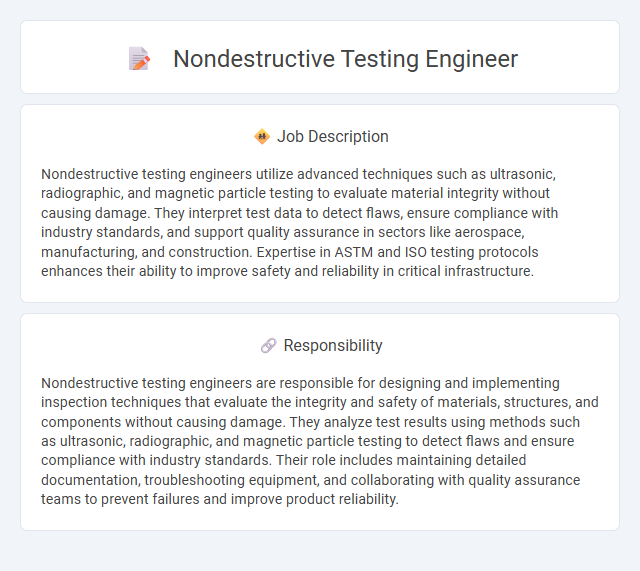
Nondestructive testing engineers utilize advanced techniques such as ultrasonic, radiographic, and magnetic particle testing to evaluate material integrity without causing damage. They interpret test data to detect flaws, ensure compliance with industry standards, and support quality assurance in sectors like aerospace, manufacturing, and construction. Expertise in ASTM and ISO testing protocols enhances their ability to improve safety and reliability in critical infrastructure.
Nondestructive testing engineers are likely to be well-suited for individuals who demonstrate strong analytical skills and attention to detail, as these traits are crucial for identifying material faults without causing damage. People with a background in engineering or applied sciences may find this role aligns well with their capabilities, especially if they are comfortable working with advanced technology and interpreting technical data. Those who prefer consistent routine tasks might find the variability and problem-solving aspects of nondestructive testing less suitable for their preferences.
Qualification
Nondestructive testing engineers typically require a bachelor's degree in mechanical engineering, materials science, or a related field, along with certifications such as ASNT Level II or III. Proficiency in ultrasonic, radiographic, magnetic particle, and dye penetrant testing methods is essential for ensuring structural integrity without damaging materials. Strong analytical skills and knowledge of industry standards like ASTM and ISO enhance an engineer's ability to identify defects and improve safety in manufacturing and construction processes.
Responsibility
Nondestructive testing engineers are responsible for designing and implementing inspection techniques that evaluate the integrity and safety of materials, structures, and components without causing damage. They analyze test results using methods such as ultrasonic, radiographic, and magnetic particle testing to detect flaws and ensure compliance with industry standards. Their role includes maintaining detailed documentation, troubleshooting equipment, and collaborating with quality assurance teams to prevent failures and improve product reliability.
Benefit
Nondestructive testing engineers likely experience benefits such as enhanced job security due to the critical importance of ensuring structural integrity across various industries. They may also receive competitive salaries and opportunities for professional growth through continual learning of advanced testing technologies. Improved workplace safety and the satisfaction of preventing potential failures are potential additional advantages in this field.
Challenge
Nondestructive testing engineers likely face challenges related to accurately identifying material flaws without causing damage, which demands high precision and advanced technical skills. The complexity of interpreting various test results may require continuous learning and adaptation to new technologies and standards. There is a strong probability that problem-solving under tight deadlines and ensuring safety compliance add to the job's demands.
Career Advancement
Nondestructive testing engineers specialize in evaluating materials and components without causing damage, using techniques such as ultrasonic, radiographic, and magnetic particle testing. Career advancement opportunities include roles like senior NDT engineer, quality assurance manager, or NDT program manager, with potential to transition into technical consulting or research and development. Gaining certifications like ASNT Level III and expertise in emerging technologies such as phased array ultrasonic testing significantly enhance promotion prospects.
 kuljobs.com
kuljobs.com